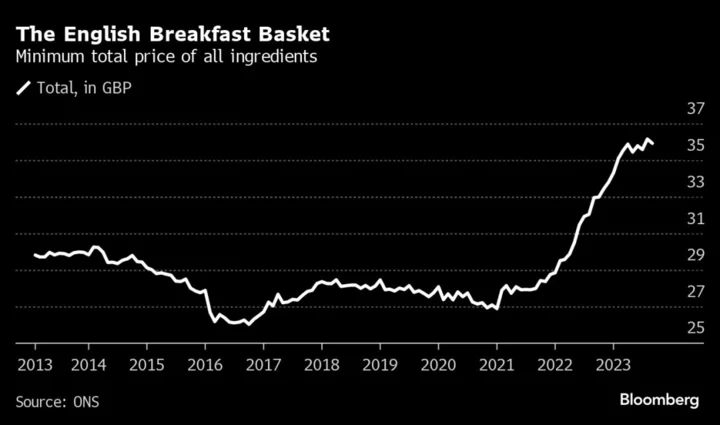The cost of a full English breakfast fell for the third time in five months as food inflation slowly eases for UK consumers.
The total cost of all the components of a fry-up dropped by 23 pence to £35.92 ($43.70) in September, more evidence that prices are plateauing following a two-year surge.
Bloomberg’s monthly Breakfast Index uses product sizes provided by the Office for National Statistics to crunch prices of sausages, bacon, eggs, bread, butter, tomatoes, mushrooms, milk, tea and coffee. It gives a taste of the real-world impact of food costs on Britons.
“More items in shoppers’ baskets in September were actually cheaper than they were earlier in the summer, which has a huge psychological impact on how well off shoppers feel,” said Lisa Hooker, industry leader for consumer markets at PricewaterhouseCoopers LLP. PwC sees food prices declining for the rest of the year.
Several items in the English breakfast were cheaper than the month before, led by coffee and butter, bringing the average price of goods down by almost 1%. Eggs, sausages, bread and mushrooms grew more expensive, while milk and bacon held flat.
Supermarkets are vying to lower prices as discounters Aldi and Lidl gain market share from their more established rivals. Marks & Spencer Group Plc cut prices on more than 200 products this month by an average of 11%. Asda said it was investing an extra £9 million to reduce prices on about the same number of items, its third round of cuts in four months.
Aldi, which became the UK’s fourth-largest grocer last year, announced reductions on almost 50 items this month by an average of about 7%. Cheese, butter and poultry were among the goods targeted.
“Slowing price increases in most food categories, alongside fierce supermarket competition, will have had an impact on shoppers’ food baskets,” said Kevin Bright, global leader of the consumer pricing practice at McKinsey & Co. Bright warned that sugar is up nearly 60%, however, which could push up prices of sweets in coming months.
Most breakfast staples are costlier than a year earlier, with the exception of butter and coffee. Eggs and sausages are around 17% more expensive, while bread costs 15% more.
Those higher prices are leading millions of Britons to skip meals on a weekly basis to try to make ends meet, according to charity Christians Against Poverty. With necessities like food and heating taking a priority, almost a third of British consumers are planning to reduce spending on Christmas this year.
Read More: One in Three Britons to Cut Christmas Spending, PwC Says (1)
“Supermarket prices are still significantly higher than they were a year ago, with the price of some everyday staples rising faster than overall food inflation,” said Sue Davies, head of food policy at consumer magazine Which.
The latest figures from the ONS’s Consumer Prices Index on Wednesday showed the pace of food inflation slowed to 12.2% in September from 13.6% a month earlier. That’s providing some relief after higher fuel prices for motorists kept the UK’s broader inflation gauge unchanged at the fastest rate in the Group of Seven countries.
“Anyone who’s had to fill up their vehicle in the last few weeks can be forgiven for uttering a few expletives as the numbers kept climbing up, whilst those who’ve stocked up on milk, eggs and cheese should have had a more pleasant experience,” said Danni Hewson, head of financial analysis at AJ Bell.
This story was produced with the assistance of Bloomberg Automation.
--With assistance from Leonid Bershidsky.

